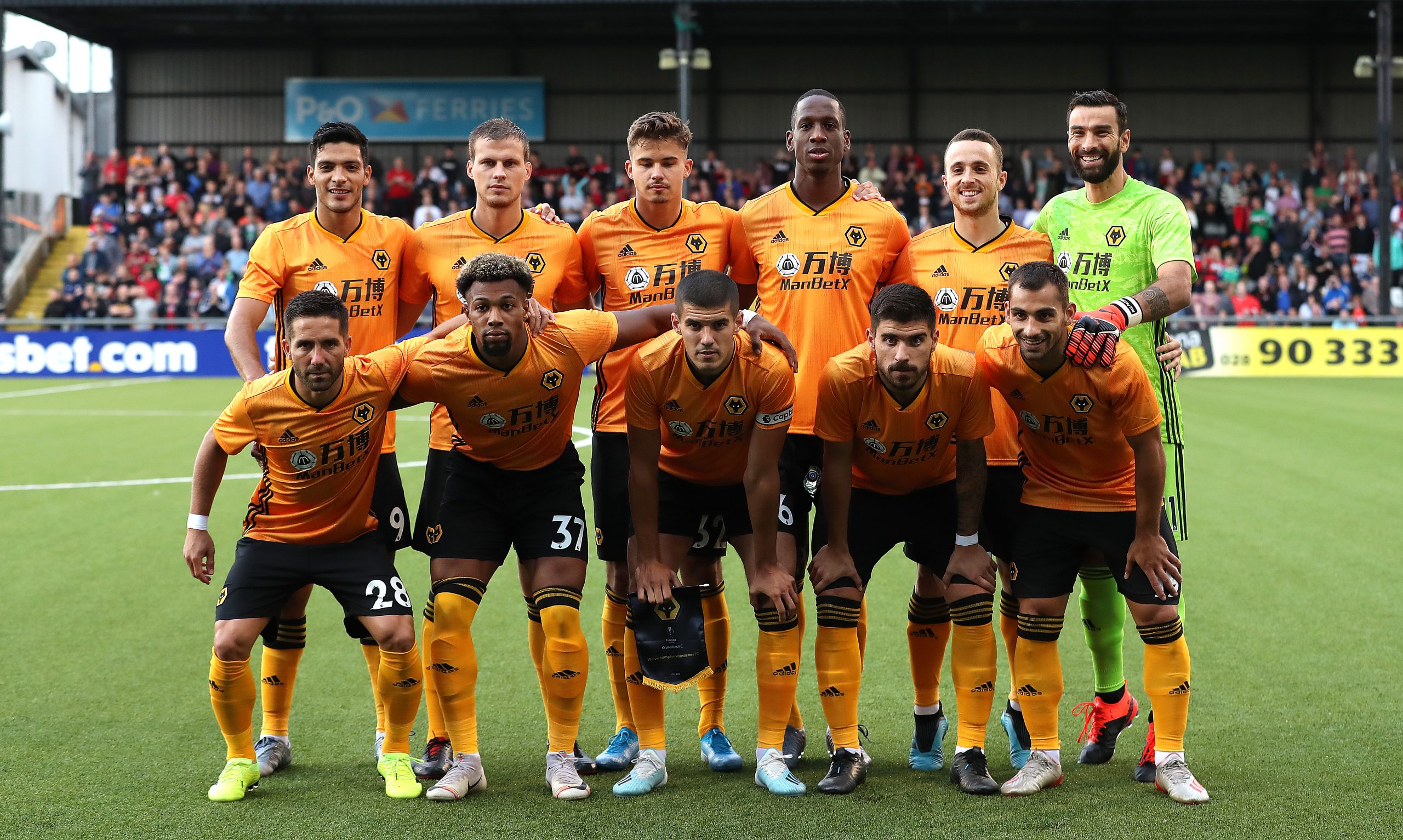Raan Jay Fai does a few very specific things and does them very well. The Bangkok street food vendor specializes in seafood dishes cooked by ski goggle-wearing chef and owner Supinya “Jay Fai” Junsuta in a charcoal-fired work. Her crab omelet has long had a dedicated following. Her work was reviewed locally decades ago and was the subject of blog posts in the foodie corners of the Internet. Raan Jay Fai achieved a new level of fame in 2017, when it received one Michelin star in the prestigious guide’s first Bangkok edition. It was the only street food vendor to make the cut. After Michelin came to town, Eater’s Rafael Tonon reported that Jay Fai had to create a reservation system to deal with crowds. Her daughter told Tonon that Jay Fai was getting worn out by the added demands on her time. “I wish I could give the star back already,” 72-year-old chef and owner Jay Fai later told Tonon. Like the observer effect in physics, popular recognition cannot help but affect that which is being lauded. The Michelin star did not render Jay Fai incapable of making crab omelets, but it changed the circumstances in which those omelets were made. There were new expectations, new demands. This, in an exceedingly roundabout way, brings us to Wolverhampton Wanderers. Like Jay Fai, the operative question with Wolves is not whether they’re good at the thing they do, but rather whether widespread recognition and the demands that come with it will in some way change their ability to do that thing. In 2018-19, Wolves did a few very specific things, and they did them well. Manager Nuno Espírito Santo kept his players close to Rui Patricio’s goal and was loath to overcommit in attack. Stationing all your players in and around your penalty box does not usually keep the other team out of it: Opponents can camp out in your third and seize on breakdowns to get good shots. Opponents of West Ham, one of only two teams to defend deeper than Wolves, shot from closer than the league average. Newcastle, which defended nearly as deep as Wolves, conceded the shortest shot distance in the league. Wolves, on the other hand, forced their opponents to take the longest shots in the league, a feat more commonly associated with high-pressing, table-topping clubs. 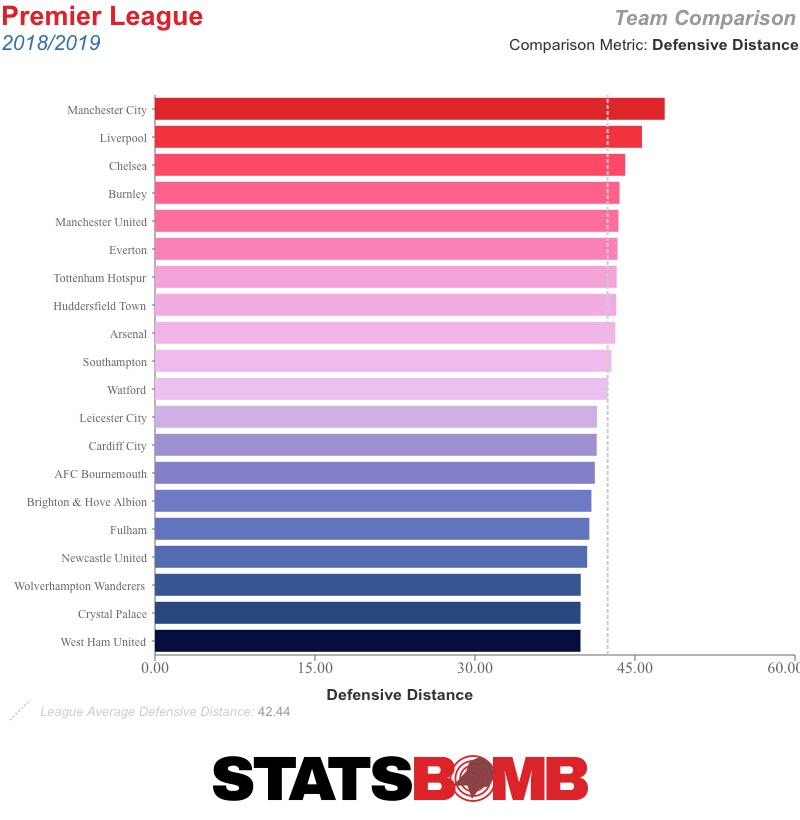
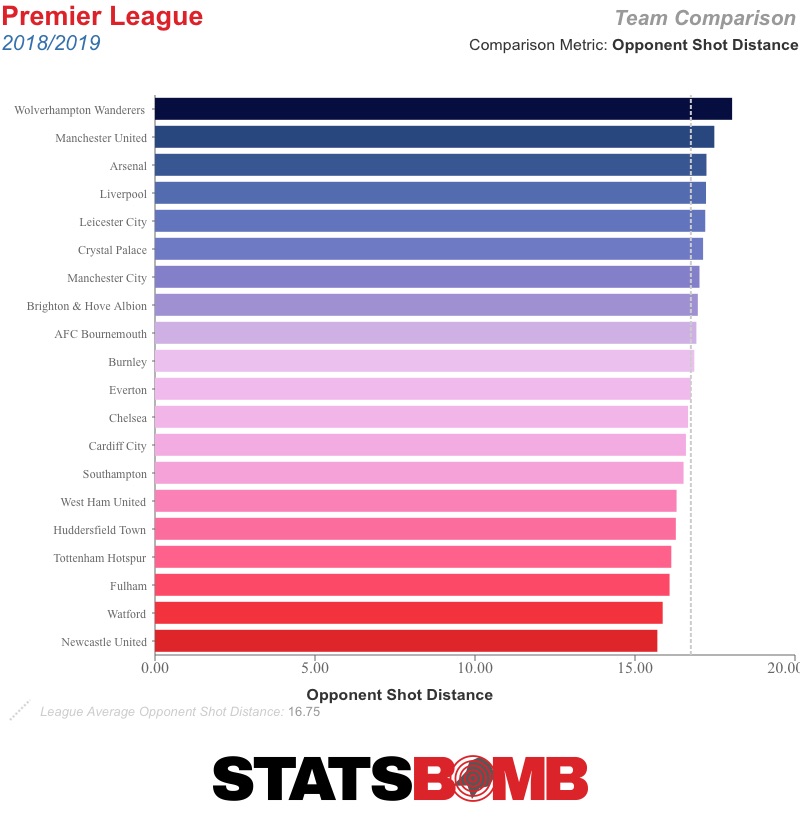 Wolves conceded slightly fewer shots than the average team, and what shots they did concede were long and with bodies in the way (read: low quality.) Those are all markers of a team that doesn’t concede many expected goals. Wolves actually conceded the fourth fewest expected goals (0.91/90 minutes) in the Premier League. They fared slightly worse in practice, conceding 8 more goals than expected. This doesn’t appear to have been a case of a goalkeeper letting down an excellent defence; Rui Patricio was basically a league-average stopper. Despite some bad luck, Wolves still tied for the fifth-best defence in the Premier League last season.
Wolves conceded slightly fewer shots than the average team, and what shots they did concede were long and with bodies in the way (read: low quality.) Those are all markers of a team that doesn’t concede many expected goals. Wolves actually conceded the fourth fewest expected goals (0.91/90 minutes) in the Premier League. They fared slightly worse in practice, conceding 8 more goals than expected. This doesn’t appear to have been a case of a goalkeeper letting down an excellent defence; Rui Patricio was basically a league-average stopper. Despite some bad luck, Wolves still tied for the fifth-best defence in the Premier League last season. 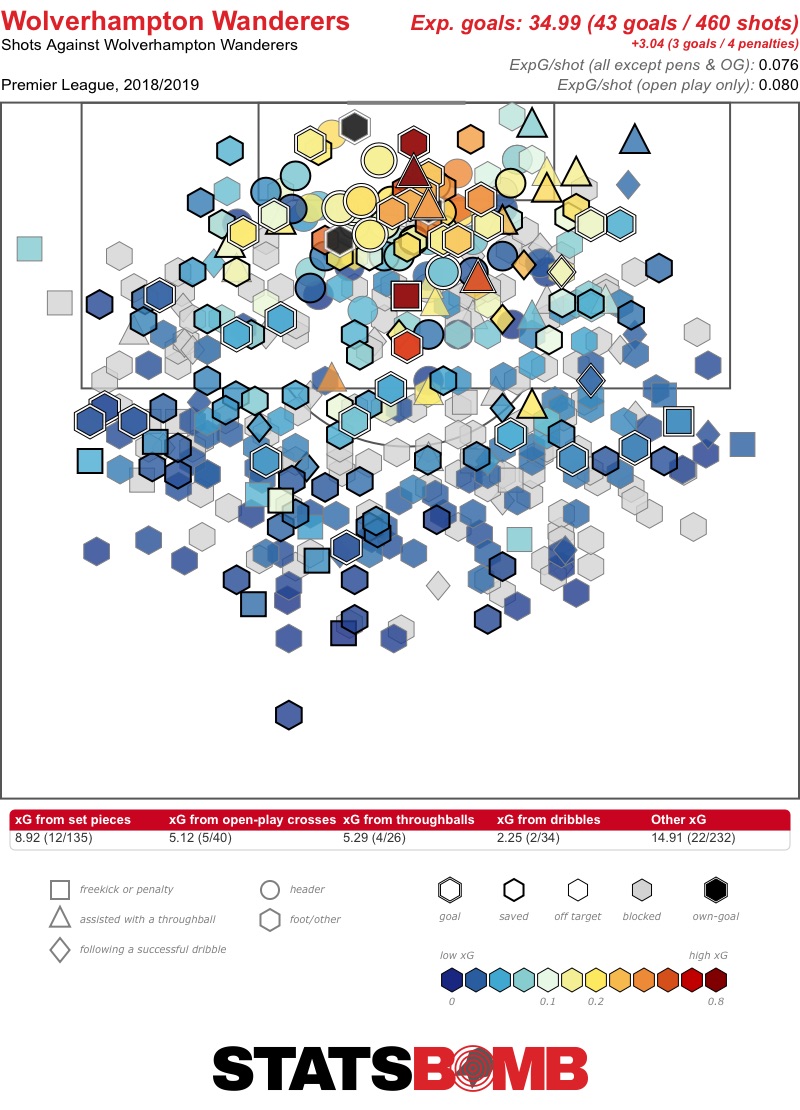 Nuno’s defensive blueprint — a back 5, midfielders who sit in front of the penalty box, refusing to overcommit in attack — dictated how his team attacked. Forwards Raúl Jiménez and Diogo Jota did the lion’s share of the team’s attacking work. For the first half of the season, Nuno deployed Hélder Costa as a third forward alongside Jota and Jiménez. Midfielder Leander Dendoncker replaced him in January as Wolves switched to more of a midfield three and contributed about as much in attack. In either configuration, fullback Matt Doherty served as an auxiliary forward when Wolves moved up the pitch and was their third goalscoring threat.
Nuno’s defensive blueprint — a back 5, midfielders who sit in front of the penalty box, refusing to overcommit in attack — dictated how his team attacked. Forwards Raúl Jiménez and Diogo Jota did the lion’s share of the team’s attacking work. For the first half of the season, Nuno deployed Hélder Costa as a third forward alongside Jota and Jiménez. Midfielder Leander Dendoncker replaced him in January as Wolves switched to more of a midfield three and contributed about as much in attack. In either configuration, fullback Matt Doherty served as an auxiliary forward when Wolves moved up the pitch and was their third goalscoring threat. 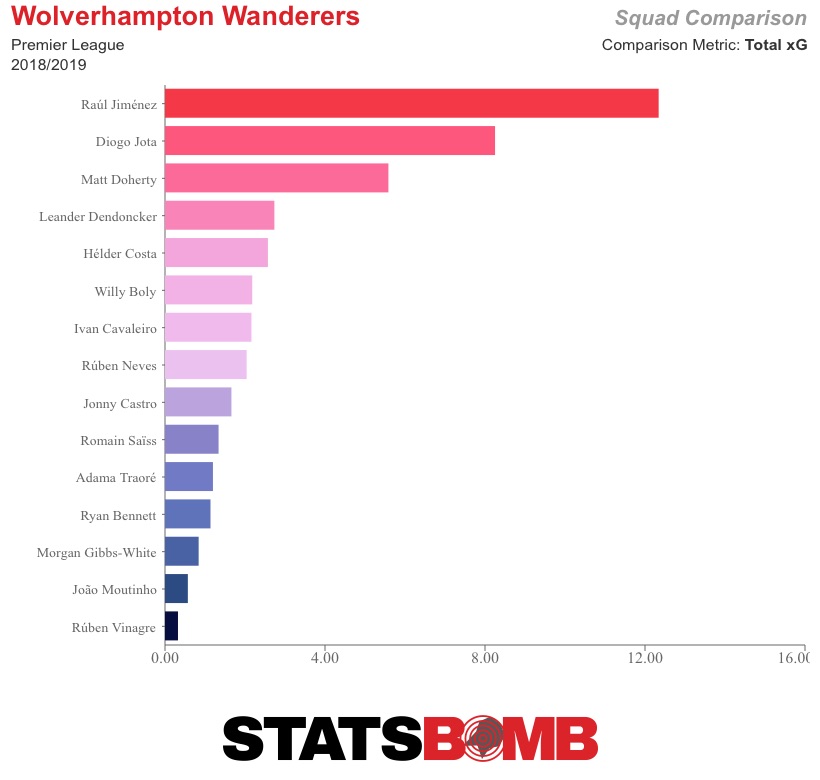 This may not sound like an inspiring attacking plan, but it worked well enough. Despite indifferent finishing, Jiménez scored 11 goals and created a bevy of chances for his teammates. At 32, Joao Moutinho was still able to provide assists from midfield. Wolves generated the seventh-most expected goals in the Premier League while playing cautiously. By just about any metric, they were a league-average attacking team. (There is no tension between those statements; the greatness of Man City and Liverpool skewed the average.) Between this wholly adequate attack and Nuno’s stifling defence, Wolves had the fourth-best expected goals difference in the league last season. Ahead of the 2019-20 season, Wolves are a sneaky pick to deliver on last year’s top-four promise. A repeat of last year’s performances, the theory goes, could be enough — especially with Chelsea, Manchester United, and Arsenal in varying states of disarray. Would that it were so simple. Even if other teams stagnate, this scenario presupposes that Nuno will get the same performances out of his squad and then somehow avoid any of the losses to smaller clubs that kept his team out of last year’s top six.
This may not sound like an inspiring attacking plan, but it worked well enough. Despite indifferent finishing, Jiménez scored 11 goals and created a bevy of chances for his teammates. At 32, Joao Moutinho was still able to provide assists from midfield. Wolves generated the seventh-most expected goals in the Premier League while playing cautiously. By just about any metric, they were a league-average attacking team. (There is no tension between those statements; the greatness of Man City and Liverpool skewed the average.) Between this wholly adequate attack and Nuno’s stifling defence, Wolves had the fourth-best expected goals difference in the league last season. Ahead of the 2019-20 season, Wolves are a sneaky pick to deliver on last year’s top-four promise. A repeat of last year’s performances, the theory goes, could be enough — especially with Chelsea, Manchester United, and Arsenal in varying states of disarray. Would that it were so simple. Even if other teams stagnate, this scenario presupposes that Nuno will get the same performances out of his squad and then somehow avoid any of the losses to smaller clubs that kept his team out of last year’s top six. 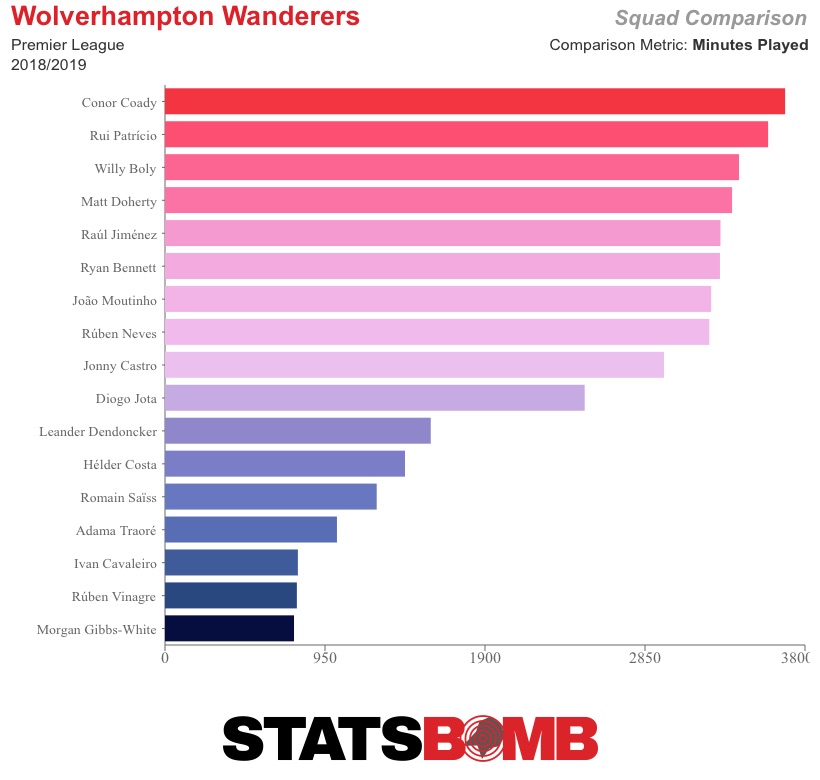 Nuno was able to use the same starters in almost every match last season. Eight outfield players logged more than 3,000 minutes in the Premier League. Diogo Jota, who suffered a mid-season ankle injury, was still played for 2,492 minutes. Costa and Dendoncker, his replacement in the lineup, provided a combined 3,003 minutes in the final outfield spot. Wolves had interesting players on the bench — Morgan Gibbs-White and Ruben Vinagre are promising youngsters; Adama Traoré is still close to that designation — but they were never overextended. What are the odds of Wolves not suffering an injury worse than Jota’s five-match ankle absence in consecutive seasons? Teams can be considered healthy without getting that lucky. With a Europa League campaign beginning in late July, there will be more demands on Nuno’s deliberately small squad this season. Even if Gibbs-White and Vinagre contribute more in their second Premier League seasons, Nuno will likely have to give more minutes to lesser players. Converting Jiménez and Dendoncker’s loans into permanent transfers, as Wolves have done, doesn’t address these limitations. Patrick Cutrone, signed for £16m from Milan, should provide forward depth where there previously was none. He provided an interesting combination of shot quality and pressing work as a 20 year old in 2017-18, but is coming off a campaign where everything but the pressing disappeared. Cutrone, who is still young and spent last year on a distinctly weird Milan team, has a decent chance of bouncing back. Wolves surely expect as much. If Nuno can get Cutrone to reach or exceed the shot volume of a league-average striker — something he has never done — he could prove to be quite the bargain. It’s been an otherwise quiet summer for Wolves. Portuguese youngsters Bruno Jordão and Pedro Neto, a central midfielder and Jorge Mendes-represented winger, respectively, were signed from Lazio. The 20-year-old Jordão played 1,168 minutes in the Portuguese second division in 2016-17. Beyond that, neither he nor the 19-year-old Neto have much of a track record. 22-year-old Real Madrid defender and Jorge Mendes client Jesús Vallejo has also arrived on loan. The club has an excellent history with these kinds of moves: Diogo Jota, centreback Willy Boly, and leftback Jonny all arrived on loan before making permanent transfers. (What could explain this? Truly, it’s a mystery!) Other players, perhaps of the Portuguese-agented variety may be signed in the coming days, but none of these moves suggest serious change is afoot at Molineux Stadium this season. “Last year’s Wolves with minor upgrades” still has a certain appeal. While Wolves were fortunate with injuries last season, they had some bad luck in conceding more goals than expected and were superior in losses to Cardiff, Huddersfield, and Brighton as well as draws with Fulham and Newcastle. Those kinds of matches going the other way this season could be enough to finish between fourth and sixth. Moreover, Wolves’ squad has a promising age profile. Moutinho is the only outfield player on the wrong side of 30. Diogo Jota and midfielder Rúben Neves are just 22, Dendoncker is 24, and Jonny is 25. These players improving, which would not be unexpected, could make up for the team’s other problems. But were Wolves simply unlucky against weaker sides last season? While clubs generally fare well when generating more expected goals than their opponents, losing when you’ve produced 0.38 or 0.24 more expected goals — as Wolves did against Cardiff and Burnley, respectively — is not that unusual. Nuno’s focus on keeping matches close didn’t just lessen the gap between Wolves and superior teams; it also made life easier for weaker sides. Defeating Arsenal and Chelsea and drawing with both Mancunian sides does little for your league finish if you keep dropping points against relegation candidates. Wolves were a more interesting best-of-the-rest team than the Evertonian sides of yore, which simply beat up on minnows, but it’s not such a surprise that they ended up in the same place. Even if Nuno decides to attack weaker sides, it’s not clear he has the team for such a two-track approach. Wolves’ midfield is not a green light away from racking up goals. Moutinho has scored 10 league goals since leaving Portugal...six years ago. Neves’ 71 shots last season were the second-most on the team. His two non-penalty goals came from potshots from distance and the only two shots he took inside the penalty box were penalties, both of which he converted.
Nuno was able to use the same starters in almost every match last season. Eight outfield players logged more than 3,000 minutes in the Premier League. Diogo Jota, who suffered a mid-season ankle injury, was still played for 2,492 minutes. Costa and Dendoncker, his replacement in the lineup, provided a combined 3,003 minutes in the final outfield spot. Wolves had interesting players on the bench — Morgan Gibbs-White and Ruben Vinagre are promising youngsters; Adama Traoré is still close to that designation — but they were never overextended. What are the odds of Wolves not suffering an injury worse than Jota’s five-match ankle absence in consecutive seasons? Teams can be considered healthy without getting that lucky. With a Europa League campaign beginning in late July, there will be more demands on Nuno’s deliberately small squad this season. Even if Gibbs-White and Vinagre contribute more in their second Premier League seasons, Nuno will likely have to give more minutes to lesser players. Converting Jiménez and Dendoncker’s loans into permanent transfers, as Wolves have done, doesn’t address these limitations. Patrick Cutrone, signed for £16m from Milan, should provide forward depth where there previously was none. He provided an interesting combination of shot quality and pressing work as a 20 year old in 2017-18, but is coming off a campaign where everything but the pressing disappeared. Cutrone, who is still young and spent last year on a distinctly weird Milan team, has a decent chance of bouncing back. Wolves surely expect as much. If Nuno can get Cutrone to reach or exceed the shot volume of a league-average striker — something he has never done — he could prove to be quite the bargain. It’s been an otherwise quiet summer for Wolves. Portuguese youngsters Bruno Jordão and Pedro Neto, a central midfielder and Jorge Mendes-represented winger, respectively, were signed from Lazio. The 20-year-old Jordão played 1,168 minutes in the Portuguese second division in 2016-17. Beyond that, neither he nor the 19-year-old Neto have much of a track record. 22-year-old Real Madrid defender and Jorge Mendes client Jesús Vallejo has also arrived on loan. The club has an excellent history with these kinds of moves: Diogo Jota, centreback Willy Boly, and leftback Jonny all arrived on loan before making permanent transfers. (What could explain this? Truly, it’s a mystery!) Other players, perhaps of the Portuguese-agented variety may be signed in the coming days, but none of these moves suggest serious change is afoot at Molineux Stadium this season. “Last year’s Wolves with minor upgrades” still has a certain appeal. While Wolves were fortunate with injuries last season, they had some bad luck in conceding more goals than expected and were superior in losses to Cardiff, Huddersfield, and Brighton as well as draws with Fulham and Newcastle. Those kinds of matches going the other way this season could be enough to finish between fourth and sixth. Moreover, Wolves’ squad has a promising age profile. Moutinho is the only outfield player on the wrong side of 30. Diogo Jota and midfielder Rúben Neves are just 22, Dendoncker is 24, and Jonny is 25. These players improving, which would not be unexpected, could make up for the team’s other problems. But were Wolves simply unlucky against weaker sides last season? While clubs generally fare well when generating more expected goals than their opponents, losing when you’ve produced 0.38 or 0.24 more expected goals — as Wolves did against Cardiff and Burnley, respectively — is not that unusual. Nuno’s focus on keeping matches close didn’t just lessen the gap between Wolves and superior teams; it also made life easier for weaker sides. Defeating Arsenal and Chelsea and drawing with both Mancunian sides does little for your league finish if you keep dropping points against relegation candidates. Wolves were a more interesting best-of-the-rest team than the Evertonian sides of yore, which simply beat up on minnows, but it’s not such a surprise that they ended up in the same place. Even if Nuno decides to attack weaker sides, it’s not clear he has the team for such a two-track approach. Wolves’ midfield is not a green light away from racking up goals. Moutinho has scored 10 league goals since leaving Portugal...six years ago. Neves’ 71 shots last season were the second-most on the team. His two non-penalty goals came from potshots from distance and the only two shots he took inside the penalty box were penalties, both of which he converted. 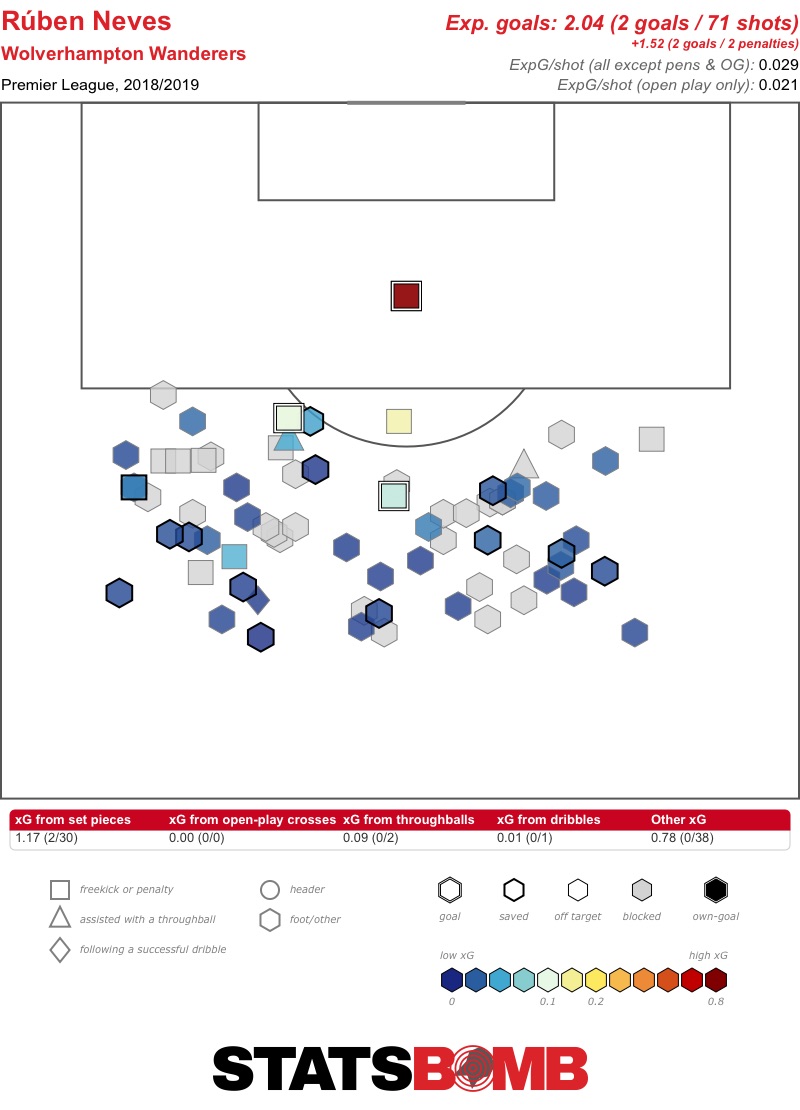 Dendocker, who scored two goals (2.6xG) in his half-season, is a defensive midfielder. He has never scored more than three goals in a league season. Like N’Golo Kanté under Maurizio Sarri, he was tasked with being an additional body running into the box. Willing midfielders can score a few goals in that role, but that doesn’t make them Marek Hamsik. Nuno telling his players to attack the likes of Newcastle might be enough to solve last year’s problems, but it won’t be pretty. Nuno may soon understand why Jay Fai wanted to return her Michelin star. Last season, when Wolves were a newly-promoted team, an underdog if you didn’t think too hard about their ownership and funding, it didn’t matter that they were occasionally confounding. This season, as the reigning best-of-the-rest and a top-six contender, those traits may read differently. A repeat of last season’s struggles against limited sides, even if it isn’t tremendously consequential, won’t be as easily shrugged off. Recognition will do that to you. Predictions about Wolves, even more than most clubs, are largely an indicator of how one feels about their Premier League rivals. Nuno’s plan is clear; his rivals remain in flux. If everything goes right, if Wolves are as healthy as last year, win all their close games and perform in line with their expected goals, the final Champions League spot should be theirs. The likelier — and more boring — scenario is that Wolves will enjoy slightly better luck against minnows, pick up fewer points against top-six rivals, and suffer a few more injuries. All of this would average out to a similar point total, but a less captivating season. Wolves could easily wind up in seventh in that scenario. With all the issues at Chelsea, Arsenal, and Manchester United, though, it’s tempting to think they’ll break into the top six. They’re good at a few very specific things, and we’re about to see how far that can take them. Header image courtesy of the Press Association
Dendocker, who scored two goals (2.6xG) in his half-season, is a defensive midfielder. He has never scored more than three goals in a league season. Like N’Golo Kanté under Maurizio Sarri, he was tasked with being an additional body running into the box. Willing midfielders can score a few goals in that role, but that doesn’t make them Marek Hamsik. Nuno telling his players to attack the likes of Newcastle might be enough to solve last year’s problems, but it won’t be pretty. Nuno may soon understand why Jay Fai wanted to return her Michelin star. Last season, when Wolves were a newly-promoted team, an underdog if you didn’t think too hard about their ownership and funding, it didn’t matter that they were occasionally confounding. This season, as the reigning best-of-the-rest and a top-six contender, those traits may read differently. A repeat of last season’s struggles against limited sides, even if it isn’t tremendously consequential, won’t be as easily shrugged off. Recognition will do that to you. Predictions about Wolves, even more than most clubs, are largely an indicator of how one feels about their Premier League rivals. Nuno’s plan is clear; his rivals remain in flux. If everything goes right, if Wolves are as healthy as last year, win all their close games and perform in line with their expected goals, the final Champions League spot should be theirs. The likelier — and more boring — scenario is that Wolves will enjoy slightly better luck against minnows, pick up fewer points against top-six rivals, and suffer a few more injuries. All of this would average out to a similar point total, but a less captivating season. Wolves could easily wind up in seventh in that scenario. With all the issues at Chelsea, Arsenal, and Manchester United, though, it’s tempting to think they’ll break into the top six. They’re good at a few very specific things, and we’re about to see how far that can take them. Header image courtesy of the Press Association
2019
Wolverhampton Wanderers: 2019-2020 Season Preview
By admin
|
August 5, 2019
